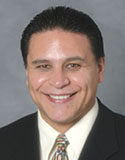Message from the CEO of Bronx-Manhattan North Association of Realtors: The Broker’s Fee Proposal - by Eliezer Rodriguez

BMNAR
On February 21, 2019, councilman Keith Powers proposed Intro. No. 1423. I refer to it as “The Broker’s Fee Proposal.” It’s a Local Law to amend the Administrative Code of the City of New York to limit the fee earned by a real estate licensee to one month’s rent. The Bronx Manhattan North Association of Realtors, (BMNAR), strongly opposes the proposed amendment.
BMNAR is one of 27 local Realtor Boards under the umbrella of the New York State Association of Realtors (NYSAR). The real estate trade represents more than 58,000 of New York State’s real estate professionals, including approximately 12,000 in New York City. Realtors, whether they are agents or brokers, are licensed professionals regulated by the New York State Department of State. The term Realtor is a registered trademark, which identifies real estate professionals who subscribe to a strict code of ethics as a member of the National Association of Realtors. You cannot call yourself a Realtor if you do not belong to a local Realtor Board. The Real Estate Board of New York, for example, is not a Realtor Board.
The Broker’s Fee Proposal will do more than unjustly target and adversely affect Realtors, it will also establish a dangerous precedent regarding private real estate transactions. Just in case the path to hiring the services of a real estate licensee is a mystery, here is how it works. A prospective tenant voluntarily seeks the services of a real estate licensee. The two private parties are usually brought together by word of mouth. The services to be rendered are disclosed and the fee to be charged is negotiated. If there is a meeting of the minds, it’s because there was an exchange of consideration and the two private parties reached an agreement. If the fee is too high, the prospective tenant can shop elsewhere for a better price or can simply opt out of using a real estate licensee.
Once the real estate licensee starts to deliver on the agreed upon services, it is extremely rare that a successful rental occurs on the very first try. After showing the prospective tenant three, four, five or more apartments, a deal may be struck, but the transaction is not completed until the lease is signed. Assuming the lease is signed and the agent is paid, that fee is shared with the broker. Sometimes the lease is not signed and the real estate licensee has expended valuable resources with nothing to show for it.
Last week, I met with a broker member and as we were discussing the careless Broker’s Fee Proposal, she disclosed her earnings for the previous year. In 2018, she grossed $51,465.40 and her expenses were $56,210.86. She may not be in the rental business much longer if her supporting husband doesn’t see a turn for the better. An agent in her firm grossed $600 in 2018. Fortunately, he has another job to help make ends meet. Unfortunately, this financial hardship is common among many brokers with an office in The Bronx and Upper Manhattan.
According to a 2017 report by the National Association of Realtors, the median gross income of a Realtor in New York State was $30,000 in 2016. Moreover, only 18% of Realtors in New York State earned more than $100,000 annually. Realtors work extremely hard to serve their clients who, by the way, rely on Realtor expertise to guide them through the somewhat baffling process of finding a place to live in New York City. The Broker’s Fee Proposal is careless as it only serves to punish hard-working Realtors without addressing the root of the problems–housing unaffordability.
An August 2017 report from Street-Easy entitled, “The Widening Gap: Rents and Wages in New York City.” found that while rents increased at 3.9% annually from 2010 to 2017, median wages rose 1.8% per year over the same period. While rental housing costs in New York City are undoubtedly high compared to other major cities, The Broker’s Fee Proposal will do very little to curtail the cost of housing. It will, however, reduce the incomes of many real estate professionals working in New York City. It makes no sense to try to hurt real estate licensees, the vast majority of whom are middle-income or less, while ignoring the housing issues.
I wonder how The Broker’s Fee Proposal would stand up against the line of cases where local municipalities were challenged based on violating the Supremacy Clause of the United States Constitution and The Sherman Antitrust Act of 1890. What The Broker’s Fee Proposal intends to accomplish is why The Sherman Act was passed–to remove government regulations from businesses and, among other things, to return private competition to the marketplace. The City of New York is not immune from being a proper defendant under the Sherman Act.
The proposed legislation, in its current form, is sponsored by 25 out of 51 council members. A whopping 78% of council members representing Manhattan, 57% from Queens, 56% from Brooklyn, and 22% from The Bronx signed on as sponsors. Not a single council member from Staten Island followed suit. In all fairness, the City Council ought to let the free market dictate what fees to charge as it has its own way of correcting itself.
It makes sense to have a Local Law to force all barber shops to list the prices for the service they provide as it helps to promote competition and I can shop for a better deal. However, to mandate how much a barber ought to charge for their services will suppress competition. Next, the City Council may mandate how much an attorney is to charge for a closing or a doctor to see an uninsured patient, and so on.
Int. No. 1423 will drastically interfere with these market forces by undercutting the negotiations that occur between the prospective tenants and the real estate professionals. The Broker’s Fee Proposal would also devalue the service provided by real estate professionals, as it fails to adequately consider New York City’s diverse rental market, including the wide-ranging rental prices and accompanying costs for Realtors who aim high to provide exceptional service to a varied client base.
Finally, imposing a limitation on the fees collected by real estate professionals for rental transactions is likely to drive qualified real estate professionals away from the rental market. This would harm prospective tenants by reducing the number and quality of professionals available to assist with their search. With fewer qualified real estate brokers or agents to help with the search, the prospective tenant will find the search for a place to live much more challenging.
For the above stated reasons, the Bronx Manhattan North Association of Realtors and the New York State Association of Realtors strongly opposes Int. No. 1423 by Council Member Powers and urges its defeat.
Eliezer Rodriguez, Esq. is the chief executive officer of The Bronx-Manhattan North Association of Realtors, Bronx, N.Y.
Veris Residential completes $75 million sale of Harborside 8/9 land parcel to Panepinto Properties


AI comes to public relations, but be cautious, experts say - by Harry Zlokower

Strategic pause - by Shallini Mehra and Chirag Doshi

Behind the post: Why reels, stories, and shorts work for CRE (and how to use them) - by Kimberly Zar Bloorian









.jpg)

.gif)